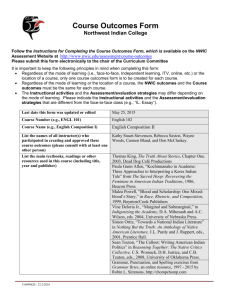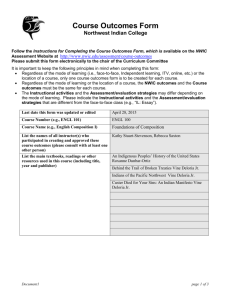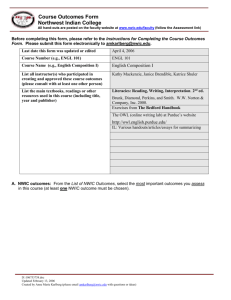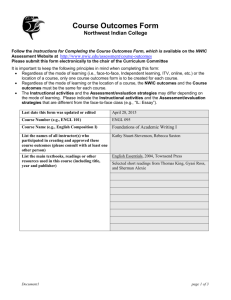ENGL 101 - Northwest Indian College
advertisement
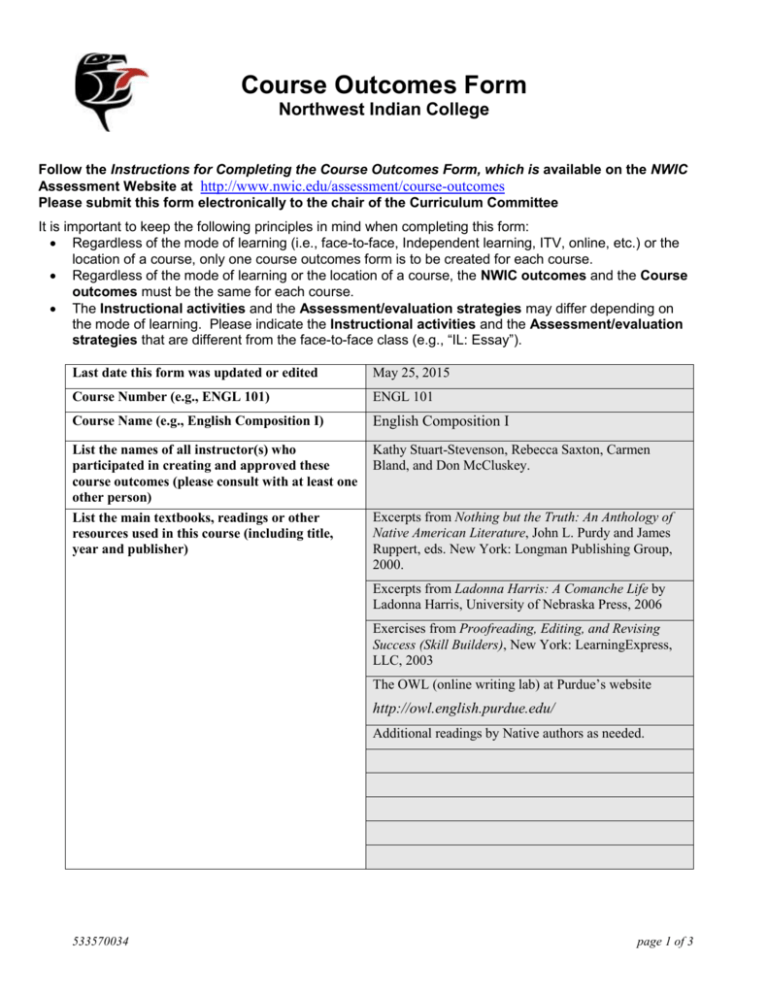
Course Outcomes Form Northwest Indian College Follow the Instructions for Completing the Course Outcomes Form, which is available on the NWIC Assessment Website at http://www.nwic.edu/assessment/course-outcomes Please submit this form electronically to the chair of the Curriculum Committee It is important to keep the following principles in mind when completing this form: Regardless of the mode of learning (i.e., face-to-face, Independent learning, ITV, online, etc.) or the location of a course, only one course outcomes form is to be created for each course. Regardless of the mode of learning or the location of a course, the NWIC outcomes and the Course outcomes must be the same for each course. The Instructional activities and the Assessment/evaluation strategies may differ depending on the mode of learning. Please indicate the Instructional activities and the Assessment/evaluation strategies that are different from the face-to-face class (e.g., “IL: Essay”). Last date this form was updated or edited May 25, 2015 Course Number (e.g., ENGL 101) ENGL 101 Course Name (e.g., English Composition I) English Composition I List the names of all instructor(s) who participated in creating and approved these course outcomes (please consult with at least one other person) List the main textbooks, readings or other resources used in this course (including title, year and publisher) Kathy Stuart-Stevenson, Rebecca Saxton, Carmen Bland, and Don McCluskey. Excerpts from Nothing but the Truth: An Anthology of Native American Literature, John L. Purdy and James Ruppert, eds. New York: Longman Publishing Group, 2000. Excerpts from Ladonna Harris: A Comanche Life by Ladonna Harris, University of Nebraska Press, 2006 Exercises from Proofreading, Editing, and Revising Success (Skill Builders), New York: LearningExpress, LLC, 2003 The OWL (online writing lab) at Purdue’s website http://owl.english.purdue.edu/ Additional readings by Native authors as needed. 533570034 page 1 of 3 A. NWIC outcomes: From the List of NWIC Outcomes, select the most important outcomes you assess in this course (at least one NWIC outcome must be chosen- maximum of four). NWIC outcome # (e.g., “Written communication: 2a. Write Standard English”) Native Leadership: to acquire a quality education - effectively communicate in diverse situations, from receiving to expressing information, both verbally and nonverbally Native Leadership: to acquire a quality education - use analytical and critical thinking skills to draw and interpret conclusions from multiple perspectives including Indigenous theory and methods Instructional Activities: How will students master this outcome? (e.g., solving problems, group activity) Assessment/Evaluation Strategies: How will you measure this outcome? (e.g., student presentations, essays) Reading, annotating, and responding to assigned readings. Short reflection, expository, and analysis essays using both MLA and APA style. Grammar, punctuation, and style written exercises. Completion of grammar, punctuation, and style written exercises. Make verbal and written comparisons and contrasts between authors using concepts and themes drawn from the reading. Short reflection, expository, and analysis essays and a 6-8 page social discourse essay utilizing research from at least 5 credible sources. Extend and theoretically apply methods for addressing social discourse issues proposed by authors. B. Course outcomes: In order of priority, list the most important other learning outcomes for this course that you assess (a maximum of 10). Other course outcomes: Complete the sentence – As a result of this course, students will be able to… Instructional Activities: How will students master this outcome? (e.g., solving problems, group activity) Assessment / Evaluation Strategies: How will you measure this outcome? (e.g., student presentations, essays) Demonstrate Standard English mechanics and grammar in creating texts. Daily writing exercises, in-class summaries, and lectures. Worksheets and exercises. Short reflection, expository, and analysis essays and a 6-8 page social discourse essay utilizing research from at least 5 credible sources. Compose and revise reflection, expository, and analysis essays. In-class modeling of annotation, summarization, and citation of academic texts. A 6-8 page social discourse essay utilizing research from at least 5 credible sources. Demonstrate academic research skills. Demonstration of methods to source credible texts on a focused topic. Show evidence of critical reading, thinking, and writing through the application of social discourse concepts and persuasive writing. Group research activities. Class discussions of reading and concepts. Daily writing exercises focused on concepts from readings. Composing and revising short reflection, expository, and analysis essays and a 6-8 page social discourse essay utilizing research from at least 5 credible sources. Discussion and demonstration of best methods for composition of clear, effective essays using academic voice, thesis within an introductory paragraph, transitions between ideas, evidence from sources, and concluding discussion. Group activity for peer-review of essay drafts. 533570034 page 2 of 3 Organize ideas in an academic style. Demonstration of accurate application of MLA and APA formatting and style to academic essays. Composing and revising short reflection, expository, and analysis essays and a 6-8 page social discourse essay utilizing research from at least 5 credible sources. Essays will use MLA or APA style and formatting. C. List the NWIC outcomes and course outcomes from above on your syllabus. D. Assess the NWIC outcomes and course outcomes, which are listed above, in your classes. 533570034 page 2 of 3
